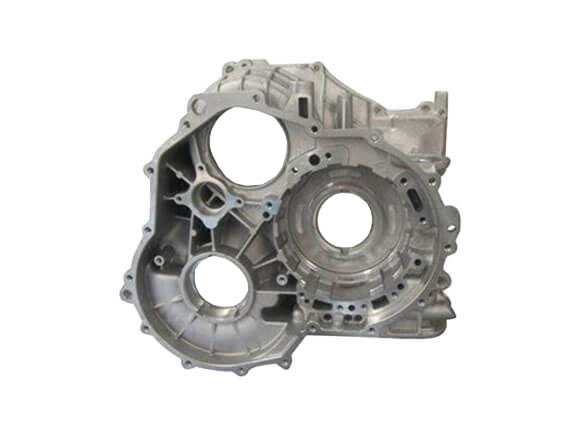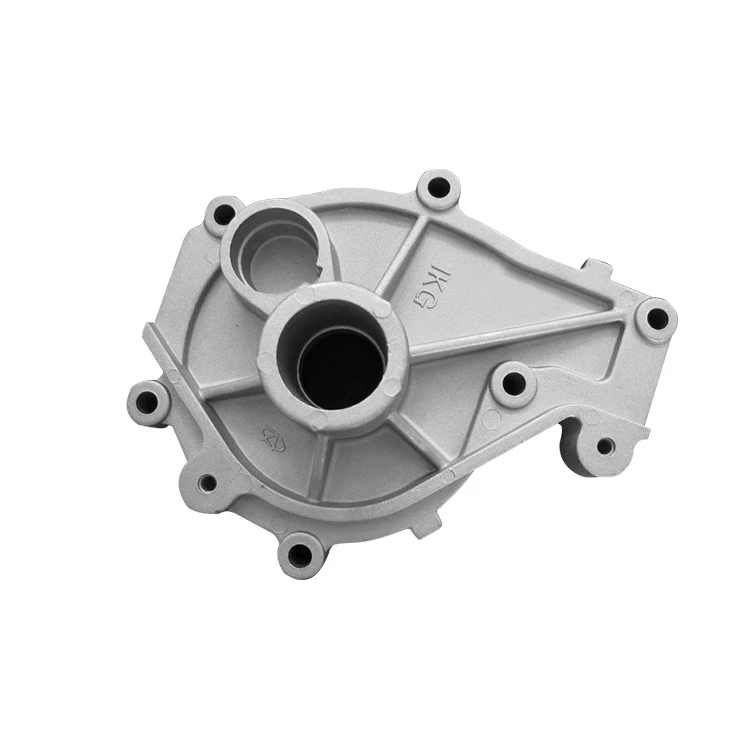The progress of aluminum casting and its modern-day applications
Wiki Article
How Light Weight Aluminum Casting Adds to Reliable Manufacturing Solutions
Aluminum spreading plays an essential role in modern-day manufacturing. Its light-weight nature and deterioration resistance make it a recommended selection for numerous sectors. Methods such as die spreading and sand casting enable the production of detailed get rid of minimal waste. The integration of automation further boosts manufacturing efficiency. Nevertheless, the implications of these improvements expand beyond simple performance. Understanding the wider effect discloses substantial insights right into the future of manufacturingThe Benefits of Light Weight Aluminum in Production
Various metals are used in production, light weight aluminum stands out due to its unique buildings that boost manufacturing efficiency and item efficiency. Its light-weight nature especially lowers transport prices and power needs in various applications. Light weight aluminum's exceptional rust resistance warranties longevity and sturdiness, reducing the need for frequent substitutes and upkeep. This metal can be easily molded and formed, permitting for functional style choices that satisfy particular industry needs. Furthermore, aluminum exhibits exceptional thermal and electrical conductivity, making it an ideal option for applications calling for effective heat dissipation and electric monitoring. The recyclability of aluminum also plays an essential function in sustainable production methods, as it can be recycled without shedding its fundamental residential properties. Generally, the advantages of light weight aluminum in manufacturing lead to set you back financial savings, boosted item long life, and a minimized environmental footprint, making it a favored product in countless sectors.Trick Light Weight Aluminum Casting Techniques
Light weight aluminum casting strategies are vital for producing top quality parts in various making procedures. The primary methods consist of sand spreading, die casting, and financial investment casting. Sand casting includes developing a mold from sand, which permits for complex shapes and huge components. This technique is usually preferred for its cost-effectiveness and flexibility. Pass away casting, on the various other hand, utilizes high-pressure to infuse molten light weight aluminum into steel molds, resulting in precise, consistent parts suitable for high-volume manufacturing. Financial investment spreading supplies superior surface area finish and detailed information by utilizing a wax pattern that is thawed away to form the mold and mildew. Each of these strategies has certain applications and advantages, permitting makers to select one of the most appropriate method based upon variables like production complexity, quantity, and product requirements. By comprehending these key methods, manufacturers can improve their manufacturing effectiveness and assure the stability of their light weight aluminum parts.Effect On Automotive Sector
As the auto industry increasingly prioritizes light-weight materials to enhance fuel effectiveness and efficiency, light weight aluminum spreading has actually arised as a crucial option. This production procedure allows automakers to generate complex elements with reduced weight without compromising structural honesty. By making use of light weight aluminum casting, manufacturers can develop parts such as engine blocks, transmission housings, and suspension components that are not just lighter however additionally display exceptional thermal conductivity and corrosion resistance.Furthermore, the flexibility of light weight aluminum spreading strategies allows the manufacturing of detailed designs, helping with technology in automobile visual appeals and functionality. As lorries end up being extra highly advanced, the capacity to integrate functions like advanced safety systems and electrical drivetrains comes to be essential.

Aerospace Applications of Aluminum Casting
Light weight aluminum spreading plays an important function in aerospace applications by allowing the manufacturing of light-weight architectural elements that boost gas efficiency. Additionally, the precision of aluminum casting permits the development of complex engine components, which are important for peak efficiency and integrity. This mix of lightweight products and specific engineering settings aluminum spreading as a vital innovation in the aerospace market.Light-weight Architectural Components
In the mission for boosted efficiency and performance in aerospace applications, light-weight architectural components have actually come to be progressively essential. Aluminum casting plays a crucial function in this venture, offering manufacturers with the capacity to create parts that are both strong and lightweight. The reduced density of aluminum permits significant weight decreases without endangering structural stability, which is crucial for airplane performance and fuel effectiveness. Furthermore, aluminum spreadings can be engineered to fulfill details layout needs, making it possible for the production of complicated geometries that conventional production techniques may struggle to attain. This adaptability not only streamlines manufacturing processes but also adds to general expense financial go to this web-site savings. As the aerospace industry remains to emphasize sustainability, the demand for lightweight aluminum components is anticipated to increase, additionally progressing advancement in production.Precision Engine Parts
Producers significantly depend on aluminum casting to generate precision engine components for aerospace applications, driven by the product's special properties. Aluminum's light-weight nature considerably decreases total aircraft weight, boosting fuel performance and performance. Its exceptional rust resistance pop over to this web-site guarantees long life in extreme environments, making it optimal for critical engine elements. In addition, aluminum casting enables for limited resistances and intricate styles, essential for enhancing engine efficiency and integrity. The casting procedure also supports mass manufacturing, enabling makers to satisfy high demand while preserving top quality criteria. As aerospace technology remains to breakthrough, the role of aluminum spreading in producing accuracy engine components will certainly be crucial in accomplishing greater performance and innovation in airplane layout and capability.Sustainability and Ecological Advantages
The growing emphasis on sustainability in manufacturing has actually placed light weight aluminum spreading as a leading option for ecologically mindful production. This process utilizes recycled light weight aluminum, which substantially minimizes energy usage compared to primary light weight aluminum manufacturing. By leveraging scrap metal, manufacturers can decrease their carbon impact and lessen waste, lining up with global sustainability objectives.In addition, aluminum spreading creates fewer damaging discharges, adding to a cleaner setting. The light-weight nature of aluminum additionally improves fuel performance in transport applications, even more advertising eco-friendly techniques.
The toughness and corrosion resistance of light weight aluminum lead to longer item lifespans, lowering the need for regular substitutes and preserving resources. As sectors progressively focus on sustainable options, aluminum casting stands apart advice as an innovative technique that not just fulfills manufacturing demands but also sustains ecological stewardship. This dedication to sustainability placements aluminum spreading as a pivotal gamer in the change towards a greener production landscape.
Expense Efficiency in Manufacturing
Expense performance is a significant benefit of aluminum spreading, matching its sustainability advantages - Precision aluminum casting. The process of light weight aluminum spreading allows for the production of complicated forms with marginal waste, which is particularly crucial in an affordable production setting. Utilizing aluminum decreases energy expenses, as it has a lower melting point contrasted to various other steels, leading to lowered energy intake during productionFurthermore, light weight aluminum's light-weight properties contribute to reduce shipping and managing prices, even more improving total price efficiency. The toughness and corrosion resistance of aluminum cast products also suggest that they require much less maintenance and replacement over time, resulting in long-term financial savings for suppliers.
In addition, innovations in casting modern technologies, such as boosted mold and mildew styles and automation, have streamlined production procedures, lowering labor prices and raising result performance. In general, price performance in aluminum casting plays an essential role in optimizing manufacturing procedures and sustaining competitive prices approaches.
Future Patterns in Aluminum Casting
The future of aluminum casting is increasingly formed by developments in automation and lasting product advancements. Automation modern technologies are anticipated to boost effectiveness and precision in the spreading process, while lasting practices intend to reduce environmental influence. With each other, these trends guarantee to redefine production criteria and methods within the light weight aluminum casting sector.Automation in Light Weight Aluminum Casting
Welcoming automation is transforming aluminum casting processes, leading the way for boosted efficiency and accuracy. Automated systems enhance production by decreasing human intervention, minimizing mistakes, and increasing throughput. Technologies such as robotic arms and computer system numerical control (CNC) equipments enable precise and consistent shaping of light weight aluminum parts. Additionally, smart sensing units keep track of different criteria in genuine time, guaranteeing excellent conditions throughout the spreading process. This integration of automation not just reduces lead times yet additionally enhances product quality by keeping tighter tolerances. As suppliers significantly take on these advanced innovations, the light weight aluminum spreading market is readied to experience considerable enhancements in functional effectiveness, cost-effectiveness, and competitiveness in the worldwide market.Lasting Product Innovations

Regularly Asked Inquiries
What Sorts Of Aluminum Alloys Are Generally Utilized in Spreading?
Typically made use of aluminum alloys in casting include 356, 380, and 413. These alloys are favored for their outstanding fluidness, toughness, and rust resistance, making them suitable for a selection of industrial applications.Just How Does Aluminum Casting Contrast to Other Metal Spreading Approaches?
Light weight aluminum casting generally uses reduced weight, superior rust resistance, and better thermal conductivity compared to various other steel spreading methods. Additionally, it permits detailed styles and faster manufacturing cycles, boosting overall manufacturing effectiveness and efficiency.What Industries Advantage A Lot Of From Aluminum Casting?
The automobile, aerospace, and electronic devices sectors benefit most from aluminum casting. These industries utilize its light-weight, corrosion-resistant homes to boost efficiency, reduce fuel consumption, and enhance general product performance, making light weight aluminum spreading significantly important.Exist Specific Design Limitations With Light Weight Aluminum Spreading?
Yes, light weight aluminum spreading has layout restrictions, consisting of constraints on wall surface density, complicated geometry difficulties, and prospective problems with accomplishing tight tolerances (Aluminum Casting Company). These factors can affect the general strength and functionality of the final productHow Is High Quality Control Maintained in Light Weight Aluminum Spreading Processes?
Quality assurance in aluminum spreading processes is preserved through strenuous evaluations, adherence to standardized procedures, and using advanced innovations. Routine monitoring warranties dimensional accuracy, surface area stability, and material uniformity throughout production, promoting total reliability.As the auto market progressively focuses on lightweight products to improve gas efficiency and efficiency, light weight aluminum casting has emerged as an important service. Light weight aluminum casting plays an important duty in aerospace applications by allowing the manufacturing of lightweight architectural parts that enhance gas efficiency. Expense effectiveness is a significant benefit of aluminum casting, complementing its sustainability advantages. Accepting automation is changing light weight aluminum casting procedures, paving the method for boosted effectiveness and accuracy. Recycled aluminum use has actually acquired grip, significantly decreasing energy usage compared to key aluminum production.
Report this wiki page